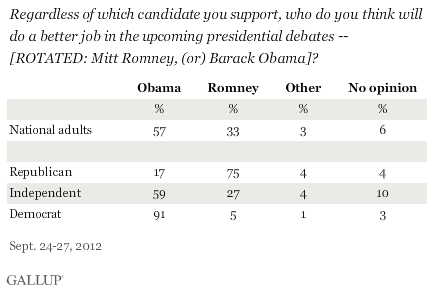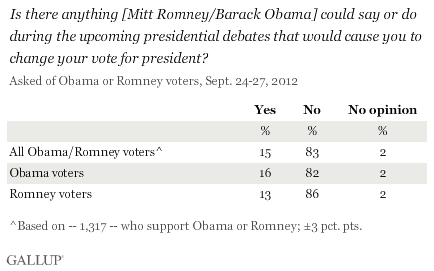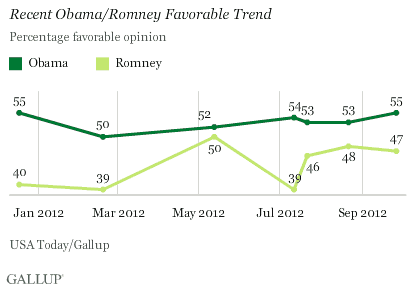PRINCETON, NJ -- Despite both candidates' efforts to downplay expectations, the majority of Americans say Barack Obama (57%) will do a better job than Mitt Romney (33%) in the upcoming presidential debates. Republicans are a little less positive that Romney will do a better job than Democrats are about Obama, while independents -- a crucial group at this stage of the campaign -- tilt strongly toward the view that Obama will do better.

The first of three presidential debates will be held at the University of Denver on Oct. 3, moderated by PBS' Jim Lehrer, with a focus on domestic affairs. The value of having high or low expectations going into a debate is an open question, but both campaigns have evidently decided to dampen expectations and to extol the debate skills of the other candidate. The Washington Post quotes Romney adviser Beth Myers as saying that Obama is "widely regarded as one of the most talented political communicators in modern history." Meanwhile Obama deputy campaign manager Stephanie Cutter says that "we're coming into this debate very realistic, that Mitt Romney is likely to win, if he plays his cards right."
Despite these public relations efforts, nine in 10 Democrats believe their candidate will do better, while a slightly smaller three-quarters of Republicans say Romney will do better. Independents are slightly more likely than the national average to say Obama's performance will be better.
The purpose of the debates is to provide additional opportunities for viewers to see and assess the candidates -- presumably as an aid to their choice of candidate on Election Day. But, 83% of Americans who say they will vote for either Obama or Romney claim there is nothing that the other candidate could do or say in the debates that would cause them to change their mind. Obama or Romney supporters are equally likely to say this.

Those expectations are consistent with Gallup research showing that presidential preferences in the larger electorate generally do not shift greatly after presidential debates.
Still, the 15% who claim that the debates could change their minds is substantial enough to make a difference in the outcome of a presidential race in which the margin between the two candidates has been narrow in recent weeks.
Obama enters the debate with an edge over Romney in terms of his overall image. Fifty-five percent of Americans have a favorable opinion of Obama, contrasted with 47% who have a favorable opinion of Romney. These images have been stable for the past three months.

Obama has generally held a slight lead over Romney in registered voters' choices for president since the end of the Democratic convention in early September. In Gallup Daily tracking for the seven days ending Oct. 1, Obama is the choice of 50% of voters, while Romney is the choice of 44%.
Implications
Americans expect that Obama will do better than Romney in Wednesday night's debate, which could work to either candidate's advantage. If Romney puts forth a reasonable performance, he could benefit from exceeding expectations in the minds of voters -- and media commentators -- and concomitantly Obama could be penalized for not meeting expectations. On the other hand, voters with the expectation that Obama is going to do better may watch the debates with that perspective in mind, and thus filter Obama's performance through that lens.
Most Americans do not think the debates will change their minds about the candidates, but enough admit to that eventuality to hold out the possibility of a change in candidate standing as a result. In addition, debates can perform the functions of increasing depth of support for candidates by their pre-existing supporters, and thus ultimately increasing their turnout at the polls.
Survey Methods
Results for this USA Today/Gallup poll are based on telephone interviews conducted Sept. 24-27, 2012, with a random sample of 1,446 adults, aged 18 and older, living in all 50 U.S. states and the District of Columbia, selected using random-digit-dial sampling.
For results based on the total sample of national adults, one can say with 95% confidence that the maximum margin of sampling error is ±3 percentage points.
Interviews are conducted with respondents on landline telephones and cellular phones, with interviews conducted in Spanish for respondents who are primarily Spanish-speaking. Each sample includes a minimum quota of 400 cell phone respondents and 600 landline respondents per 1,000 national adults, with additional minimum quotas among landline respondents by region. Landline telephone numbers are chosen at random among listed telephone numbers. Cell phone numbers are selected using random-digit-dial methods. Landline respondents are chosen at random within each household on the basis of which member had the most recent birthday.
Samples are weighted by gender, age, race, Hispanic ethnicity, education, region, adults in the household, and phone status (cell phone only/landline only/both, cell phone mostly, and having an unlisted landline number). Demographic weighting targets are based on the March 2011 Current Population Survey figures for the aged 18 and older non-institutionalized population living in U.S. telephone households. All reported margins of sampling error include the computed design effects for weighting and sample design.
In addition to sampling error, question wording and practical difficulties in conducting surveys can introduce error or bias into the findings of public opinion polls.
View methodology, full question results, and trend data.
For more details on Gallup's polling methodology, visit https://www.gallup.com/.
